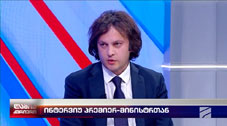
Kobakhidze Lays Out Political Agenda in Rustavi 2 Interview, Targets Opposition and Foreign Influence
By Liza Mchedlidze
Friday, April 18, 2025
Prime Minister Irakli Kobakhidze appeared on the pro-government Rustavi 2 television channel on April 16, delivering a wide-ranging interview in which he touched on key domestic political issues and renewed his attacks on the opposition, civil society, and alleged foreign interference.
Looking ahead to Georgia's upcoming local elections in October, Kobakhidze expressed confidence in a sweeping Georgian Dream (GD) victory, regardless of whether opposition parties participate. "If they participate, they will be defeated badly, and if they don't participate, this will also be a defeat. For us, this [the opposition's participation] has no substantial meaning," he said.
Dismissing the idea that one-party control of local governance could undermine democratic norms, Kobakhidze instead targeted opposition groups, referring to the four parties that won seats in the last elections as "agents." He added, "I wish there were an opposition that wasn't [at the very least] a network of foreign agents. As soon as this spectrum vanishes, as soon as the spectrum of agents vanishes from the [Georgian] political space," a genuine opposition would "naturally" emerge.
Kobakhidze also addressed the ruling party's effort to formally ban certain opposition parties, saying the process in the Constitutional Court would conclude by the end of the year. The move hinges on the final report from the GD-controlled parliamentary investigative commission probing alleged crimes by the United National Movement (UNM) and others.
The prime minister launched a harsh rebuke of former Prime Minister and now opposition leader Giorgi Gakharia, who recently testified before the parliamentary commission investigating the events of "Gavrilov's Night" - the brutal June 20, 2019 crackdown on anti-Russian protests.
Kobakhidze said the GD leadership had initially agreed Gakharia should resign after the violence, but foreign influence intervened. "The discussion took place after June 20, and in the end it was decided that Gakharia should have left his post. [But] there was a phone call from the 'deep state.' It was a [foreign] official, a high official, who called from abroad and said that his dismissal would not be feasible," he claimed. Gakharia, he argued, became prime minister under the "influence" of this external power, and "Georgia's sovereignty was limited" until he left the party in 2021.
Kobakhidze defended the work of the investigative commission, particularly its focus on the 2008 August War with Russia. He reiterated the GD narrative blaming the conflict on the previous government: "It was Saakashvili's bloody regime, the agents! When agents start a war. when an illegitimate, criminal regime starts large-scale military operations, this cannot in any way mean that Georgia started the war."
He also weighed in on a recent controversial statement by commission chair Tea Tsulukiani regarding national hero Giorgi Antsukhelidze, who was tortured and executed by Russian forces after the war. While Tsulukiani claimed Antsukhelidze was "sacrificed for Saakashvili's PR campaign," Kobakhidze corrected her slightly, saying, "We don't need to create new heroes [who would be claimed by war]. We need heroes who serve their homeland not through sacrifice in war, but by contributing to the country's development."
On the 36th anniversary of the April 9, 1989 massacre, Kobakhidze stirred backlash by referring to the Soviet Union merely as a "foreign power" without directly naming Russia. Critics accused him of historical whitewashing, but Kobakhidze doubled down: "Georgian liberals and liberals in general have a limited mind." He further elaborated: "Among those who dispersed the [1989] April 9 demonstration and killed people were not only Russians. but also Ukrainians, Baltic, Central Asians, and others. It was the Soviet Union."
The prime minister also defended recently adopted amendments to Georgia's Law on Grants, which require government approval for foreign funding of domestic organizations. "If there is anything that this legislation protects, it is precisely, first and foremost, the interests of Georgian society," he said. Civil society organizations have criticized the law as an attempt to defund watchdogs and silence dissent.
Addressing the ongoing crackdown on pro-EU protests, Kobakhidze described most of those arrested as "victims" of propaganda. But he singled out detained journalist Mzia Amaghlobeli, editor of Batumelebi and Netgazeti, accusing her of having a "task - to downgrade the police and insult their dignity."
While advocating for a "humanistic approach" toward young protesters, Kobakhidze emphasized that the law must still be enforced.
In response to Russian Deputy Foreign Minister Mikhail Galuzin's recent statement about restoring diplomatic ties with Georgia, Kobakhidze was firm: "Not to mention anything else, but even legally it is impossible for us to talk about restoring diplomatic relations [with Russia] under occupation."
Finally, he reaffirmed the GD party's antagonistic stance toward parts of the U.S. establishment. According to Kobakhidze, relations with Washington would only improve with the "defeat of the deep state."

